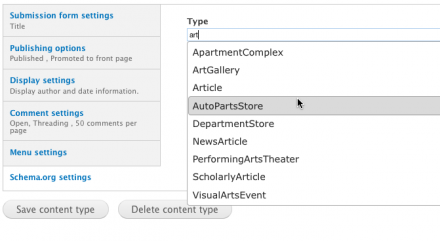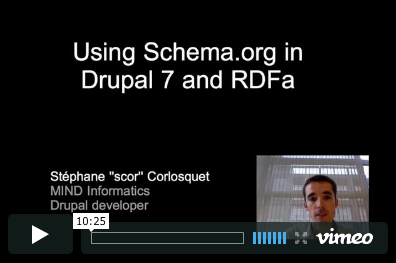 Support for Drupal 7 is ending on 5 January 2025—it’s time to migrate to Drupal 10! Learn about the many benefits of Drupal 10 and find migration tools in our resource center.
Support for Drupal 7 is ending on 5 January 2025—it’s time to migrate to Drupal 10! Learn about the many benefits of Drupal 10 and find migration tools in our resource center.This project is not covered by Drupal’s security advisory policy.
Description
This project is a drop-in solution to enable the collections of schemas available at schema.org on your Drupal 7 site. The major search engines including Bing, Google and Yahoo! have agreed to recognized these in order to improve the display of search results.
Documentation
Screencast: learn how to use this module to build Google Rich Snippets for people, events and recipes.
Features
Sites administrators can specify what schema.org terms they want to associate with their content types (e.g. Art Gallery, House, Event, Person, etc.) and their fields (description, participants, etc).
Contributed field modules
Not all contrib fields are supported yet, but more and more fields are being added to the schemaorg_contrib module which is part of this project. Currently supported are:
Make sure to enable "Schema.org support for contributed modules" to benefit from this feature. No configuration is required as long as there is a schema.org mapping set for each field where you want schema.org support, for example 'address' for an adddressfield field, or 'aggregateRating' for a fivestar field.
The date field is also supported, but make sure to install the RDFa module for optimal HTML markup.
Syntax
The syntax generated by this module is the one of Drupal 7 core: RDFa 1.0. Note that this syntax is not officially supported by schema.org, which supports microdata and RDFa Lite 1.1. However Google is able to parse Drupal 7 markup without any problem (see examples further down). If you prefer to use microdata, please see the Drupal microdata module instead of this module. You should not use this module together with the microdata module, they each output a different syntax, and there is no advantage in having both syntaxes at the same time.
RDFa 1.0 has been supported by Google since 2009 for the first version of its Rich Snippets and its Data Vocabulary. Although this is not documented anywhere, Google recently started to show Rich Snippets for schema.org/RDFa in its testing tool (example) and in live search results (example). This module relies on this non official feature as an interim solution while transitioning from RDFa 1.0 to RDFa 1.1. This module will be updated as this syntax becomes stable and supported by the schema.org sponsors.
Known incompatibilities
Because this module relies on the RDFa markup of Drupal core, it suffers from these limitations:
- under certain conditions views and panels will override or produce incorrect RDFa markup
Please check out the Microdata module instead which supports some of these scenarios.
Drupal Commerce
If your site is built with Drupal Commerce, you should use the Good Relations for Drupal Commerce module instead of this schema.org module.
Status
This module has been successfully tested to produce Rich Snippets on both live results and the Google Rich Snippets testing tool.
Live search results produced by this module:
- Person: Bryan House
- Event: Riga Junior Open 2014
- Listing of events
- Recipe
Google Rich Snippets testing tool examples:
- Person: Dries Buytaert
- Event: Riga Junior Open 2014
- Listing of events
- Recipe
Drupal 8
The default RDF mappings of Drupal core have been updated to include schema.org in Drupal 8. Also, a lot of the backend code of this module was ported into Drupal 8 core. The User Interface allowing to set the mappings lives in the RDF UI, which is based on Sachini's Google Summer of Code project.
Drupal 6
The module leverages the native RDFa layer present in Drupal 7 core. Doing the same in Drupal 6 is quite difficult and would involve a lot of patching or unreliable regular expressions. There is no plan to backport this module to Drupal 6.
Project information
4,416 sites report using this module
- Created by scor on , updated
This project is not covered by the security advisory policy.
Use at your own risk! It may have publicly disclosed vulnerabilities.
Releases
Development version: 7.x-1.x-dev updated 4 Mar 2015 at 10:23 UTC













